The Opera Singer's Challenge: What Technology Can't Replace
For over a decade, I've been searching for my path to professional mastery—trying startups, consulting, and management without finding that deeper connection. I labeled myself a generalist, trying to soothe my remorse from what felt like an inability to commit to mastering one field. It has been frustrating trying to be the jack of all trades but master of none.
Then I met Mike Dewis, an accomplished opera soloist who said something that stopped me in my tracks:
"Opera remains one of the purest performances left. There's no technology standing between the singer and audience. You can only rely on your craft."
When he speaks, how he articulates and uses his voice makes you want to listen. His words brought in me a feeling of awe for what he represents and longing for true professional mastery. There before me stood Mike, embodied mastery, although I know he himself would deny it, being too modest. Someone who dedicated his professional career to mastering operatic performance that escapes modern technological advancement.
In a world that increasingly values efficiency, speed, and technological shortcuts, there's something powerful about rediscovering the deeper satisfaction and personal fulfillment that comes from mastery—the patient development of skill and understanding over time. This isn't about rejecting technology but rather asking how it might enhance rather than replace our journey toward excellence.
Coming from the tech world, I felt I have something important to learn from Mike. In a technocratic culture fostering impatience, efficiency over mastery, over-reliance on technology potentially leading to a decline in human experience:
What remains essentially human in mastery even as technology transforms our work?
Craft and Wisdom: The Two Dimensions of Mastery
"When I stand in front of the audience I can only rely on my craft from thousands of hours of practice and my artistry (mastery) of storytelling, drawing on my personal experiences."
Mike's perspective revealed a powerful framework for understanding mastery—one that transcends opera and offers insight for all of us navigating a technology-driven world. True mastery, I realized, consists of two dimensions:
Craft - technical skills that can be systematically learned, and
Wisdom - the personal dimension that develops through reflective practice and the integration of knowledge into intuition – tacit knowledge, or experiential wisdom.
To illustrate the difference let's take a look at a couple of examples:
The Chef's Palate
A chef can follow a recipe perfectly (craft) but the ability to taste something and instinctively know what it needs—a touch more acid, a hint of heat, a subtle herb—comes from years of cooking, tasting, and developing their palate (wisdom). No recipe can capture this intuitive sensing that allows them to elevate dishes beyond technical execution.The Diagnostician's Intuition
A doctor can follow diagnostic protocols and interpret test results accurately (craft), but the ability to notice subtle inconsistencies in a patient's story, recognize patterns that don't fit textbook cases, and sense which questions to ask next comes from years of clinical experience (wisdom). No medical algorithm can fully capture this intuitive sensing that allows exceptional physicians to diagnose complex cases that defy standard categorization.The Developer's Elegance
A programmer can write code that executes correctly and efficiently (craft), but what distinguishes exceptional developers is their ability to create solutions with an intuitive simplicity and adaptability that anticipates future needs (wisdom). Two developers with identical technical knowledge will produce remarkably different systems based on their accumulated experience with how code evolves and how humans interact with technology.
Technology interacts differently with these two dimensions. For craft skills, technology can provide legitimate shortcuts and accelerate learning. However, the wisdom dimension has an inherently experiential nature that can't be bypassed. The result is a form of 'hollow craft' that lacks the deeper understanding that comes only through experience and reflection.
This Craft and Wisdom framework helps us identify when technology truly enhances our growth versus when it offers false shortcuts around essential experiences. I'll deepen this in the following sections.
This distinction between craft and wisdom isn't entirely new - it resonates with several established frameworks in the study of expertise and mastery:
Michael Polanyi's "Tacit Knowledge" Concept
Polanyi's distinction between explicit knowledge (which can be codified and transferred) and tacit knowledge (which can only be acquired through experience) parallels the craft/wisdom distinction. His famous phrase "we know more than we can tell" captures the essence of the wisdom element.Donald Schön's "Reflection-in-Action"
In "The Reflective Practitioner," Schön distinguishes between "technical rationality" (applying learned theories and techniques) and "reflection-in-action" (the wisdom professionals develop that allows them to think while doing). This closely aligns with the craft/wisdom framework.
The Shortcut Illusion: What Technology Can and Cannot Accelerate
Technology offers unprecedented efficiency in developing craft skills - the technical foundation of any domain. This efficiency creates genuine value, through the removal of unnecessary barriers, democratizing access to knowledge, and accelerating learning curves. The risk isn't in these shortcuts themselves, but in our cultural blindness to what they can't accelerate: the development of wisdom.
Technology can genuinely accelerate craft acquisition, but it can't substitute for the wisdom that comes only through experience.
A novice chef can quickly learn techniques through video tutorials, and a beginning programmer can leverage frameworks that handle routine coding tasks. But for wisdom development, technology often attempts to bypass rather than support the essential experiences. The chef app that promises perfect dishes without understanding flavor principles, or the AI coding assistant that generates solutions without building the intuition for elegant design or understanding code – these offer the appearance of mastery without the developmental journey that creates true expertise. The result is a form of 'hollow craft' that lacks a deeper understanding.
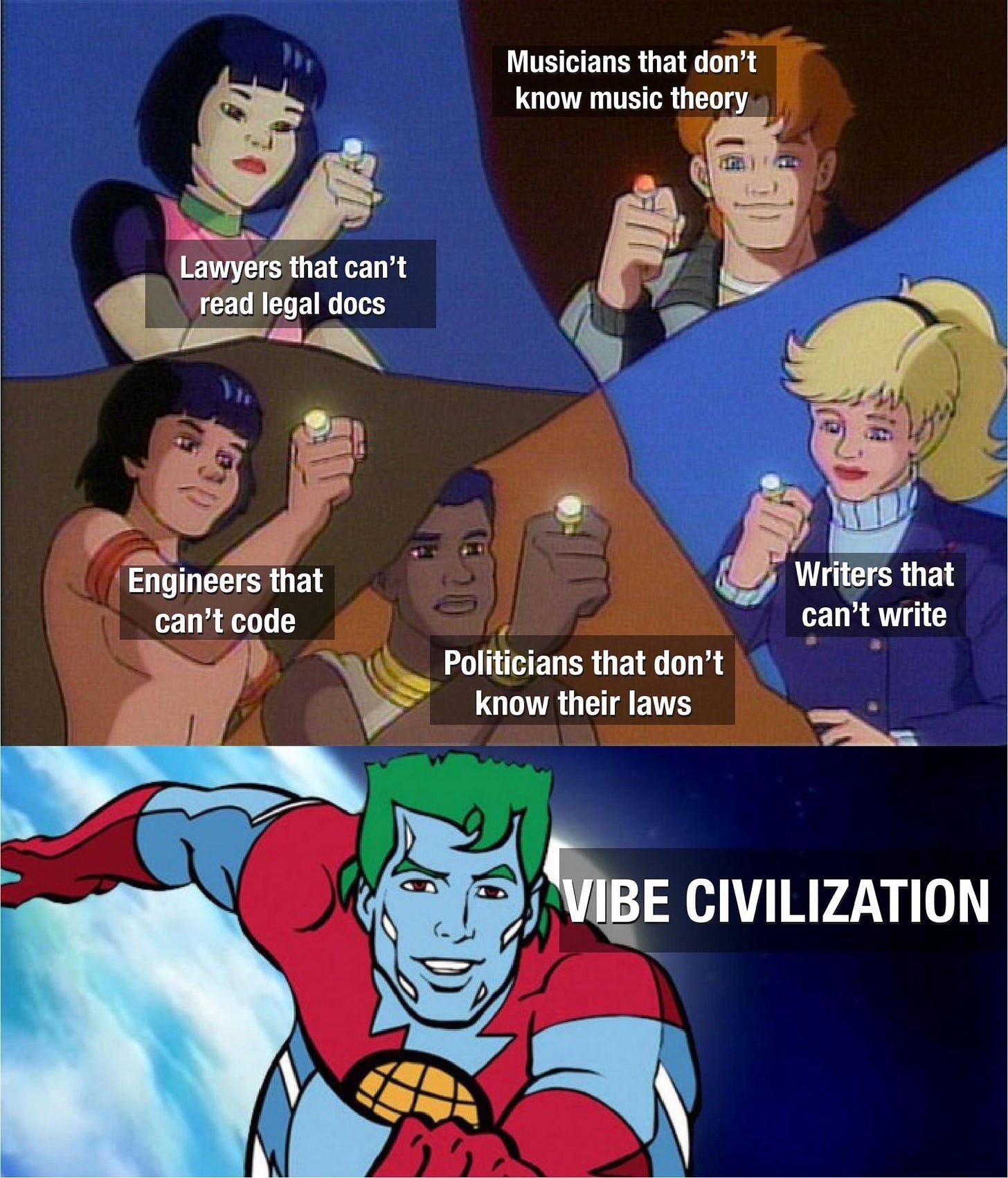
Wisdom emerges from integrated experience - not just time served, but reflective engagement that transforms knowledge into embodied understanding. This integration can't be downloaded or automated; it must be lived.
Our cultural shift toward immediate results and constant optimization creates an environment where the patience required for mastery development feels increasingly foreign.
Thoughtful Integration: Technology as Partner, Not Replacement
The most powerful relationship with technology isn't rejection or uncritical embrace, but thoughtful integration - knowing when efficiency serves our development and when it might undermine the deeper engagement necessary for wisdom development. This good judgment itself might be the meta-skill of our age.
Perhaps what we need isn't less technology but more intentional technology - tools designed not just for efficiency but for enhancing the integration that leads to true mastery. What would technology look like if designed explicitly to support the development of human mastery in its fullest sense?
From my experience, here are some approaches to thoughtful technology integration that I've found valuable:
Writing with GenAI
Craft enhancement: Using AI to improve grammar, suggest word alternatives, and format documents
Wisdom preservation: Developing initial ideas, thesis statements, and unique perspectives yourself before seeking AI assistance
Thoughtful integration: Writing first drafts manually to develop your voice, then using AI for editing suggestions that you thoughtfully evaluate rather than automatically accept
Research and Learning
Craft enhancement: Using AI to summarize articles and explain complex concepts
Wisdom preservation: Forming your own connections between ideas and developing critical perspective
Thoughtful integration: Asking AI for explanations, then attempting to teach the concept back to verify understanding
Client Presentations
Craft enhancement: Using AI to format slides, suggest transitions, and polish language
Wisdom preservation: Developing your unique approach to storytelling and client relationship dynamics
Thoughtful integration: Outlining your key insights manually, using AI for production aspects, then customizing to reflect your consulting style
The Irreplaceable Guide: Why Mentors Matter More in the AI Age
In our conversation with Mike, we touched on the crucial role of mentors in the pursuit of excellence, particularly in the arts. Mike emphasized the importance of a mentor's ability to provide constructive criticism and guide the artist towards excellence, even if it means challenging the artist's own preferences.
Unfortunately in the tech sector I come from, having mentors is not a common practice. But I would argue that in the world accelerated by AI advancements, mentorship should become standard in professional development. AI accelerates craft skill but can't guide wisdom development. That's where true mentorship can bridge the gap between skill and wisdom by:
Providing personalized guidance on which technological shortcuts are valuable vs. which might undermine development.
Offering compressed wisdom through stories and case examples that accelerate pattern recognition when similar situations arise, effectively compressing years of experience.
Experience teaches mentors which 20% of effort yields 80% of growth. By directing attention to these high-leverage aspects of practice, mentors create learning shortcuts.
The seamless integration of craft and wisdom is difficult to understand conceptually but can be observed in a mentor's work. This modeling provides an embodied example of what integration looks like in practice, giving apprentices a target to aim for.
I have true mentors in my life. Not formal arrangements, but informal relationships with people I highly value and look up to. It is a small group of people I make sure to stay in touch with. On numerous occasions they guided me where I didn't develop my own intuition yet or where just their experience outgrows mine. (Thank you 💚 Aga, Łukasz, Jasiek, Jan, Jinder)
Finding Purpose: From Generalist to Focused Explorer
My conversation with Mike began as research for an article but revealed something deeply personal. As he spoke about opera's pure craft and lifelong dedication, I recognized what had been missing in my own journey - not just skill or knowledge, but purpose. A north star worthy of true mastery.
In the process of distilling this Craft & Wisdom framework, I found unexpected clarity about my own calling: to explore how we can develop healthier, more intentional relationships with technology – creating approaches that enhance human potential while building sustainable value for our collective future.
This resonates with my core experiences - from years developing healthcare solutions to studying exponential technologies at Singularity University. I've always been drawn to technology's potential for good, yet concerned about its unintended consequences. What I lacked wasn't capability but clarity of purpose. This is the purpose worthy of dedicated mastery I've been searching for - one that builds on my past while addressing our collective future.
At this critical inflection point where technology is reshaping human experience, this exploration matters on multiple levels:
For individuals: Finding balance that expands capabilities without undermining wellbeing and authentic connection
For organizations: Creating systems where technology augments human strengths with sustainable economic models
For society: Ensuring technology serves human flourishing through thoughtful governance and values
Sometimes the most valuable discoveries come from unexpected conversations. What began with Mike's reflection on opera ended with clarity about my own path to mastery.
Beyond the Framework: Limitations and Promise
Like any framework, this one also has its limitations:
The neat division between craft and wisdom exists more on a spectrum in reality, with many aspects of "wisdom" teachable through different methods.
What we consider intuitive (wisdom) in Western contexts may be explicitly codified in other traditions.
As AI advances, the boundaries between what technology can and cannot accelerate will likely shift.
The framework focuses primarily on individual mastery when today's excellence often emerges from collective knowledge and networked expertise.
Mastery itself evolves alongside technology - transforming what we value and how we develop it.
Despite these limitations, I find the Craft & Wisdom lens valuable for approaching technology with better judgment. It offers a practical way to assess when technology truly enhances our development versus when it might offer appealing but ultimately hollow shortcuts.
My exploration of healthier technology relationships is just beginning, but I'm convinced that our most valuable innovations won't come from blindly accelerating everything, but from carefully choosing what to optimize and what to experience fully. Perhaps true wisdom in the AI age lies in knowing which shortcuts to take and which journeys require the full, unabbreviated path.
I invite you to stay with me in this exploration as we seek technology relationships that enhance our humanity rather than diminish it. Feel free to reach out with any questions or to share your own perspectives on mastery in our technological age.
— Yarmo Covich




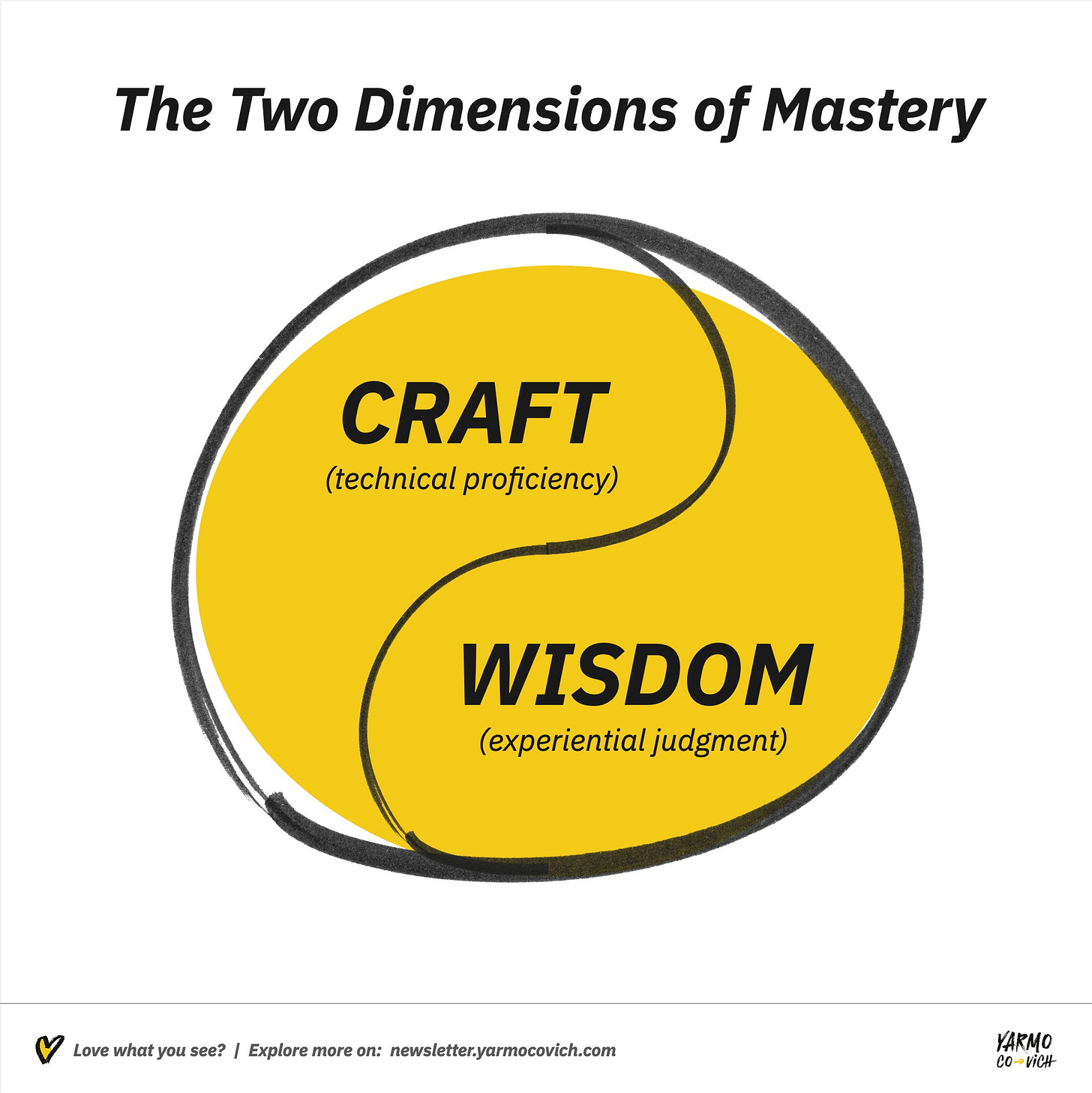
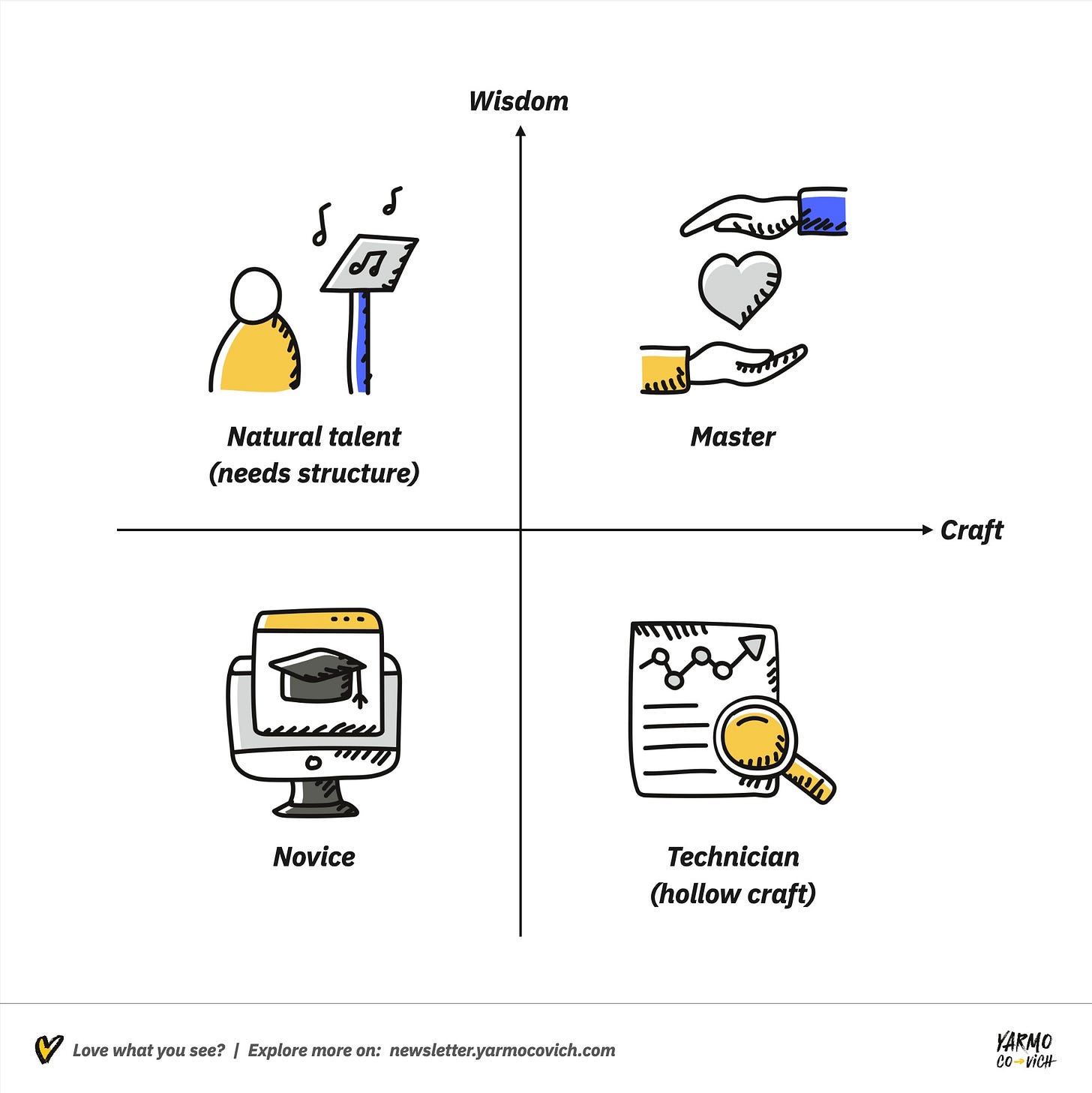
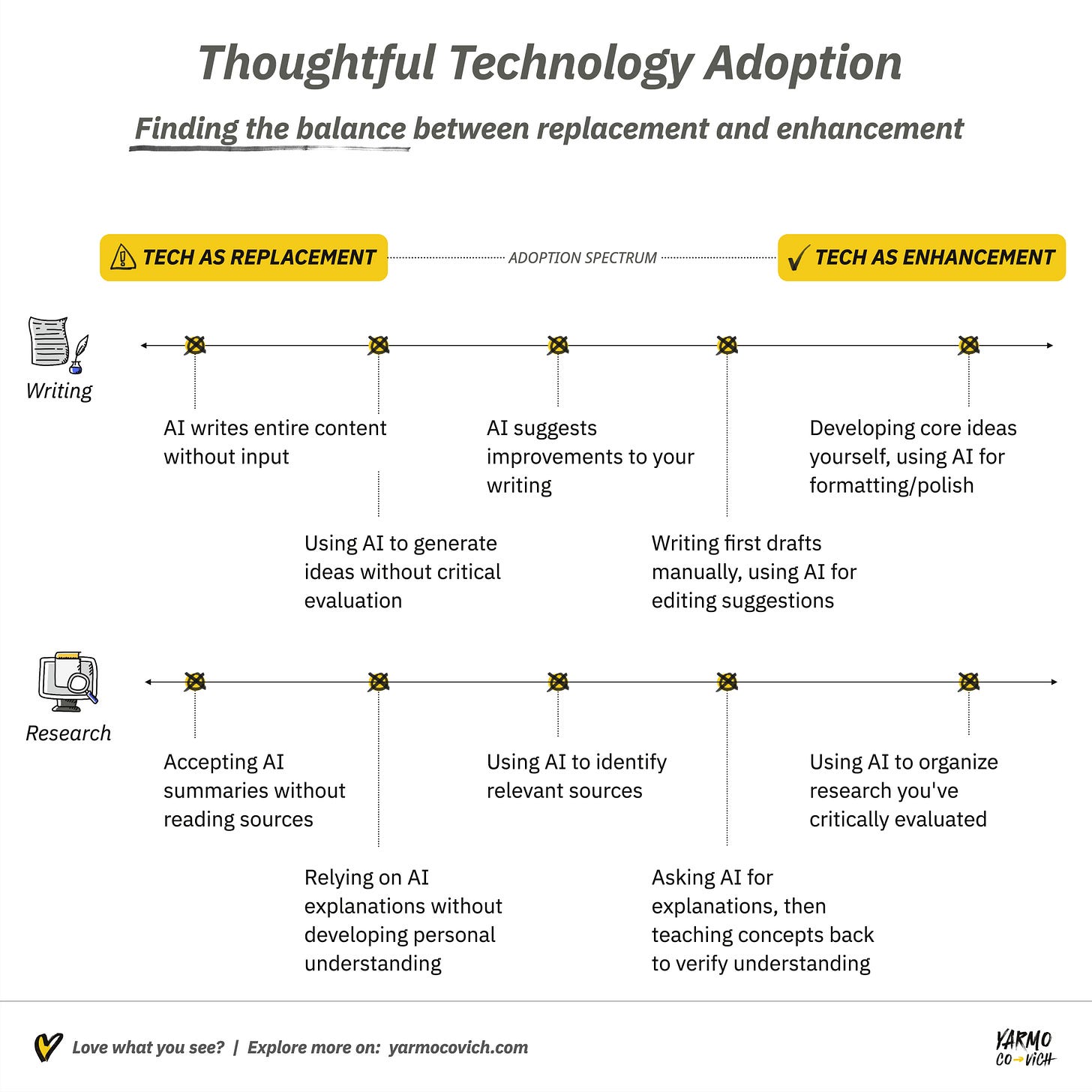
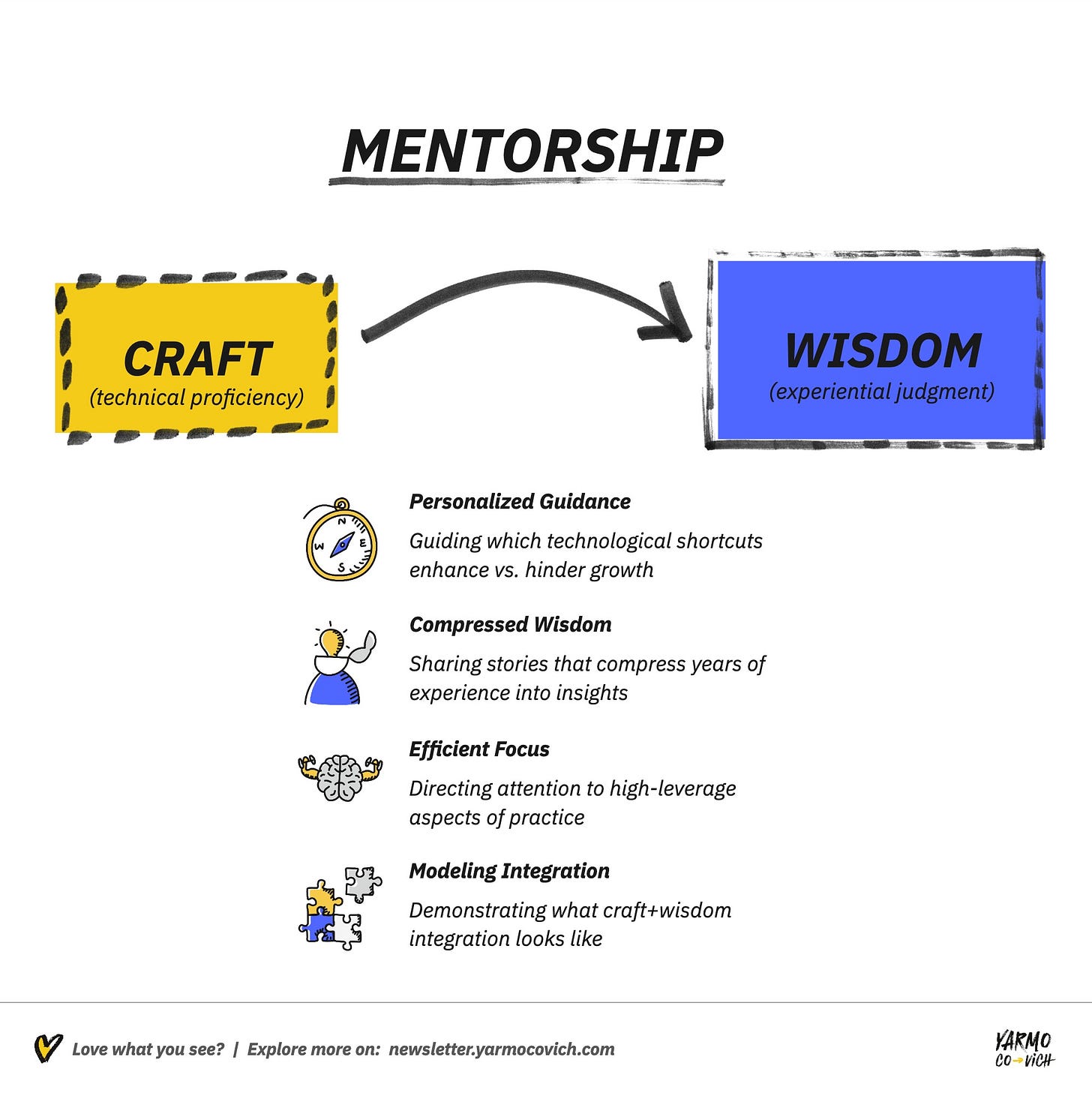
„Two developers with identical technical knowledge will produce remarkably different systems based on their accumulated experience with how code evolves and how humans interact with technology.”
I love all examples! For the programming context — I like to use the analogy of a chef (Engineer) and a cook (Developer). Not all developers are engineers, just as not all cooks are chefs :)
Hi Paweł!
Great research which I've read from cover to cover :)
IMHO there is also one important dimension - time spent and effort we make along the way from novice through craft toward artistry.
There is an old 10000-hours rule that is sometimes ridiculed through memes these days.
But there is truth in it - you must be exposed for enough time and through enough in-depth effort to foundations of the craft to start seeing flashes of artistry.
I heard on one of podcasts of Lex Fridman with The Primeagen as a guest saying that "Work Smart Not Hard" is a BS. The true saying should be "Work Hard Get Smart".
In other words you have to work very hard for very long time to the point when craft becomes automatic, spotting patterns become obvious, even unconscious, and artistry may start to flourish by just playing with the craft. The keyword: "playing".
I believe technology could be absolutely helpful in shrinking these 10000 hours as much as possible by providing tools to expose, in a guided, smart way, an individual to foundations of the craft. To expose her/him to variety of very much distilled building blocks and foundations, to ensure the individual sees, and experience all critical patterns within the craft multiple times.
In this way the technology could significantly lower entry level to the group of privileged craftsmen and artists in particular specialisation. The group of people who had opportunity to deal with 10000-rule for themselves either by their true commitment and absolute discipline or being really lucky to have strong passion to something while being very young and free. When you are a child you may just play with the craft while having plenty of time (may seem even infinite at this age) and plenty of energy.
If one is not disciplined enough or does not have enough time some strong support from technology to guide you through the valley of tears would be a make-it-or-break-it factor to even start dreaming of being an artist one day.